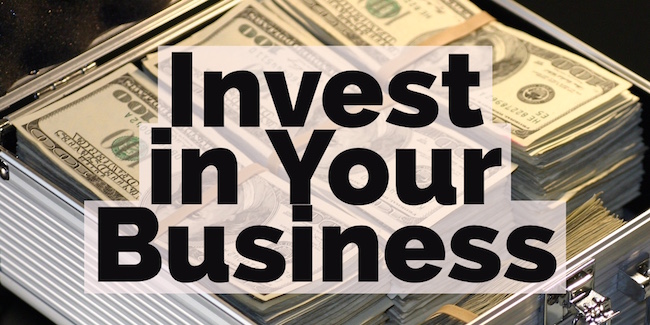How can you make the most out of your profits?
If you’ve reached the point where your income exceeds your expenditure, determining what to do with the remainder can be challenging. There is a myriad of options, and you don’t want to make the wrong decision and lose your momentum. Fortunately, identifying the best investment doesn’t have to be complicated.
The first step is to consider your personal finances. It’s much easier to start moving your money in new directions when you’ve established a solid foundation. Read on to learn more.
Getting Started
Here are two basic factors to keep in mind before you continue:
- Credit Card Debt
If you have any, it’s wise to focus on paying it off. There are very few – if any – investments that you’ll have access to which can consistently outperform the roughly 14% APR that your bank charges to service your debt. You’ll earn far more from your investment without those fees.
- Emergency Fund
Both in your company and life outside of business, an endless number of problems can arise that warrant an emergency fund. From an economic downturn to natural disasters to sicknesses, having a solid pile of cash to rely on greatly lessens the impact of many unthinkable situations.
Aim to secure from six months to an entire year of living expenses, ideally in the form of a savings account. This has the added benefit of earning some interest that you can leverage elsewhere.
Back Into Your Business
With the above-mentioned areas covered, you might want to look into growing your business.
Investing in improvements and opportunities is likely what brought you to the point of being able to choose alternatives in the first place. As for whether or not you should take this approach is up to you. If it’s clear that putting your profits back into your company is the best way forward, then begin by establishing the following:
- A high-level forecast of the year ahead
- An understanding of your cash flow
- How much you can safely invest
Of course, the money you’re investing has to come from somewhere. You can break down your revenue into four main categories, namely profit, taxes, operating costs, and what you take home for living expenses. The exact numbers here will naturally vary depending on the industry, size, and realities of your business.
An example based on $2,000 in monthly sales might be:
- 5% to take home as profit ($100)
- 15% to pay taxes ($300)
- 40% on operating costs ($800)
- 40% on owner’s compensation ($800)
In any case, documenting these figures will give you an overview of where your money is going and where you could invest it. With the example above, there’s isn’t much left over to put back in the company. This means you would need to either take less home from the profit or owner’s compensation categories.
Let’s assume you have enough to put back into your business. Where should that money go? It’s important to determine what areas could benefit the most from an investment, as well as how improving those areas will ultimately affect your bottom line.
Perhaps you should focus on attracting more customers. Then marketing, particularly the digital kind, would likely be on your shortlist. It might also be a good idea to enhance the customer experience. Here are a few other top candidates for reinvesting your profits:
- Equipment
- Expansion
- Infrastructure
- Insurance
- Outsourcing
- Hiring new staff
- Human resources (benefits and training)
- Yourself (coaching and courses)
At the end of the day, you must decide whether you can forgo investing in any of these aspects and rather look beyond your organization. If so, then the following section outlines 7 sensible ways to invest your business income.
Stocks
Thanks to the internet and online trading platforms, now is an ideal time to invest your money in the stock market. You can purchase shares through a broker, financial planner or one of the websites that offer these services.
As you may be aware, stocks essentially represent pieces of a company in the form of shares, which pay out dividends based on the total profits of the company. Your earnings are also influenced by the per-share prices. There’s a lot to learn here and you’ll need to educate yourself on the basics before investing any real money.
It’s crucial to understand that stocks are volatile, and you can lose just as much as you make. Buying shares in different companies can reduce your risk and is known as diversifying your portfolio.
Another solution is to invest through an automated trading platform or robo-advisor. These are algorithm-driven financial planning services that do most of the work for you. They also provide a range of additional features like apps, learning resources, and various types of portfolios. Some of the leading automated trading platforms include:
- Betterment
- Personal Capital
- Interactive Advisors
- Wealthsimple
Trade Commodities
These come in two flavours, namely hard and soft commodities. The former involves activities such as drilling and mining to find resources like metals and natural gas. The latter can be farmed or grown. Both are shaped by supply and demand on the market, with the price increasing when supply decreases.
Investing in trade commodities is much like using the stock market. You can put your money directly into a commodity or use a commodity futures contract. Alternatively, you can purchase certain shares of exchange-traded funds (ETFs) or just buy stocks in companies that deal in trade commodities.
Registered Education Savings Plan
As an entrepreneur with young family members, one of the best investments you can make is a registered education savings plan (RESP). This is a regulated account designed to help you save for your child or grandchild’s post-secondary education. The main draw of an RESP is that your interest isn’t subject to income taxes.
A registered education savings plan comes in three different forms and you can learn all about them and their benefits on Wealthsimple. Their website also offers an investment master class and various other insightful resources on personal finance. Wealthsimple itself is a leading automated investment platform for various products including cash, crypto, and stocks. You can use their service to build an investment portfolio or simply buy and sell commission-free shares.
Retirement Account
Sticking to sensible savings accounts, your retirement account is probably one of the most important no matter what kind of business you own. These also provide tax advantages but are limited when it comes to how much you can contribute and when you have access to the money.
Most Canadians opt for a Registered Retirement Savings Plan (RRSP). Your contributions to your RRSP aren’t taxed for as long as you add money to the fund. A tax-free savings account (TFSA) offers similar benefits and unlike a registered savings account, you can withdraw the funds at any time.
Mutual Funds
As the name suggests, mutual funds involve pooling your money together with other investors. The total is then used by managers to purchase securities for the group. It’s generally recommended to start with mutual funds or ETFs before trying your hand at individual stocks, as these types of funds allow you to invest in a broad portfolio in one move.
Not only are they safer since they’re diversified, but they also tend to be less expensive when it comes to fees. You either pay a single trading commission or purchase the fund directly from the provider, in which case there may be no fee at all.
Mutual funds can be bought through a brokerage account and are available as investment products on most of the online platforms that we mentioned above.
Bonds
Another way to leverage your investment against the prosperity of other organizations is with bonds. These can namely be corporate, municipal, or treasury and are debt securities that raise capital for the recipient. Your investment may finance new companies or government projects.
While no investment of this nature is absolutely risk-free, government bonds are pretty close. There are also online services such as Worthy Bonds, which lend to businesses using your investment. Each bond is worth $10 and is tied to a 36-month term and 5% return rate with interest paid weekly.
The conditions of your investment can vary depending on the provider, so it’s important to do your research here. Make sure that the service only deals with companies whose liquid assets exceed the value of the loan and no penalties are charged for cashing out your bond before it reaches maturity.
Real Estate
While real estate investing has the potential to make you very wealthy, it might not be the most sensible option. Not all business owners can turn drywall into gold while running a company and would likely be better off with a more passive investment method.
Real estate is awash with large and expensive complications. But if you’re up for the challenge or you are already familiar with the industry, there are opportunities to find success here.
So, where will you be putting your money? Regardless, remember to do plenty of research beforehand to ensure that you know exactly how to go about making your investment.



